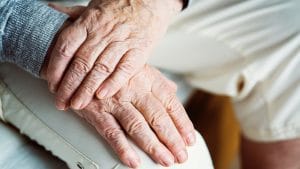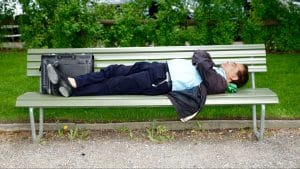Caffeine and Sleep: Two Sworn Enemies
written by / May 7, 2022

About 85% of people in the US consume products with caffeine on a daily basis. In addition, 43% of Americans use caffeine to deal with daytime sleepiness. Such striking stats are among the main reasons why we’ll be talking about the relationship between caffeine and sleep.
Although this stimulant may boost your energy and increase alertness, it can also have some adverse effects on your health. Keep on reading to find out how caffeine can affect your mind and body, and how healthy sleep habits can help you reduce caffeine consumption.
What You Should Know About Caffeine
When we say caffeine, you probably first think of a cup of coffee. While it’s true that this popular beverage contains caffeine, this isn’t its only natural source. Actually, caffeine can be found in over 60 different plants, not just coffee beans, cocoa beans, and tea leaves.
So What Is Caffeine?
It’s a natural stimulant, meaning it’s a psychoactive substance with many effects on the nervous system. Besides being present in a variety of plants, it can also be produced synthetically.
Caffeine Effects
Everybody knows that caffeine makes us feel more alert, but let’s try to explain what happens in our bodies when we have a cup of coffee or tea.
Firstly, we absorb this substance through our stomach. Once it enters our bloodstream, it affects our levels of:
- adenosine
- dopamine
- melatonin.
Adenosine is a neurochemical that makes us feel more sleepy. Caffeine prevents this effect by blocking adenosine receptors. On the other hand, it boosts dopamine levels, which increases alertness.
Finally, caffeine messes with our sleep cycle by suppressing the production of melatonin, a sleep-inducing hormone. Interestingly, caffeine seems to have an even more substantial effect on melatonin levels than bright light does.
How Long Do the Effects of Caffeine Last?
Once you consume caffeine, you won’t feel an immediate wake-up boost. In fact, the earliest you can expect its effects to kick in is 15 minutes upon consumption. Caffeine typically reaches a peak level within 60 minutes, and it can affect your body for hours.
The time typically required for your body to eliminate half of the substance (also known as the half-life of caffeine)—is 3–5 hours. What’s more, it takes up to 10 hours for the effects of this stimulant to ease entirely.
How Long Does Caffeine Withdrawal Last?
Generally speaking, the more caffeine you’re used to drinking, the stronger your withdrawal symptoms will be.
Withdrawal symptoms appear 12 to 24 hours after the last caffeine intake and can last anywhere from two to nine days. So, if you’re trying to flush caffeine out of your system entirely, bear in mind that you have to be patient.
Negative Effects of Caffeine
Many of us regularly rely on the stimulant to keep us going through our daily activities and various responsibilities. However, when consuming it, we need to bear some possible negative effects in mind so we’ll know how to avoid them better.
Effects of Caffeine on the Sleep-Wake Cycle
Since caffeine has a stimulative effect, it affects our night slumber negatively. Therefore, it’s best to avoid caffeinated beverages before bedtime. People who consume caffeine in the late afternoon or in the evening often have trouble falling and staying asleep.
In addition to this difficulty, they may wake up several times during the night to go to the bathroom since caffeine is well-known to have diuretic properties.
According to a JCSM study, consuming caffeinated beverages up to six hours before going to bed still results in interrupted sleep. Another common occurrence are delays in the sleep-wake cycle. Put simply, you’ll likely fall asleep later and spend less time in the restorative sleep stages.
However, the effects of caffeine vary among people. For example, the elderly are generally more sensitive to caffeinated beverages than younger people. Genetics also play a big role in caffeine tolerance.
Finally, people who regularly drink caffeine become less sensitive to its effects over time.
Other Adverse Caffeine Side Effects
In addition to having a disruptive effect on sleep quality, caffeine can have other unwanted effects on our health, such as:
- sweating
- nausea
- muscle tremors.
They usually become pronounced when we consume larger doses of this popular stimulant. For example, we usually drink coffee to increase our alertness. However, if we drink too much coffee, it can make us anxious and nervous.
Since caffeine has a mild diuretic and sometimes even a laxative effect, some people drink coffee in the morning to stimulate bowel movement. Although this can be considered one of the positive effects of caffeine, larger amounts can lead to diarrhea.
Furthermore, caffeine can increase blood pressure, especially in people who aren’t used to consuming it. The good news is that this effect is only temporary. Nevertheless, try not to consume large amounts of caffeine, especially not before working out.
It’s also been noticed that caffeinated beverages can increase the heart rate in some people. This usually happens with higher doses or if you’re particularly sensitive to this stimulant. In addition, substantial amounts of caffeine can alter your heartbeat rhythm.
Positive Effects of Caffeine
Nothing is either black or white, and this goes for caffeine, too. If you consume caffeinated beverages moderately, you can reap several health benefits.
First, caffeine can boost your energy levels and increase alertness. However, this doesn’t mean that you should replace a good night’s sleep with a cup of coffee because nothing can make up for the benefits of sleep.
Furthermore, according to the findings of several studies, caffeine promotes fat burning. It also lowers the risk of:
- Alzheimer’s disease
- dementia
- Parkinson’s.
Keep in mind that if you drink caffeine regularly, you might become addicted to it, though not in the most typical sense of the word. People who regularly consume caffeine can experience withdrawal symptoms. These usually include:
- headaches
- fatigue
- anxiety.
Tips on Caffeine Consumption
- You shouldn’t drink caffeine regularly since it can become less effective.
- You shouldn’t consume more than 400 mg of caffeine a day (3–4 cups of coffee).
- Pregnant or breastfeeding women should limit their caffeine intake to 1–2 cups of coffee, or 200mg of caffeine.
- To avoid the side effects of caffeine on sleep, you shouldn’t consume it after 2 p.m.
- Avoid high caffeine doses if you have heart problems.
- The FDA advises consumers to avoid pure powdered caffeine.
Caffeine Content in Different Products
Considering the relationship between caffeine and sleep quality, we’ve provided a table with the caffeine content in different products. Hopefully, this list will help you manage your daily caffeine intake.
| Product | Serving Size | Caffeine Content |
| Brewed coffee | 8oz | 95mg |
| Espresso | 1oz | 60.1mg |
| Decaf coffee | 8oz | 2mg |
| Tea | 8oz | 26.2mg |
| Red Bull | 12oz | 110.7mg |
| Coca-Cola | 12oz | 29.4mg |
| Pepsi (regular) | 12oz | 38mg |
| Hot chocolate | 1oz | 0.6mg |
| Milk chocolate | 100g | 20mg |
Reducing Caffeine Intake
Getting a sufficient amount of sleep is the best way to reduce your craving for coffee or similar stimulating beverages. For adults, it’s recommended to sleep 7–9 hours a night. Unfortunately, according to a recent poll from Gallup, Americans sleep 6.8 hours per night on average.
Since (excessive) consumption of caffeine and sleep deprivation usually go hand in hand, you should try to limit your daily intake of caffeinated drinks and improve your sleep habits. If you wake up tired and feel sleepy during the day, consider these tips for improving your slumber:
- Go to bed and wake up at the same time every day, including weekends.
- Don’t consume caffeine close to bedtime since you’ll have trouble falling asleep afterward.
- Sleep in a dark, quiet, and pleasantly cool bedroom.
- Create a relaxing bedtime routine, which will help you unwind.
- Buy a comfortable and supportive mattress and pillow.
- Your bedroom should be reserved for sleep and sex only.
- Don’t eat 2–3 hours before going to bed.
- Don’t use electronic devices (e.g., your cell phone, tablet, laptop) close to bedtime.
Conclusion
Caffeine can have both positive and negative effects on your body and mind. It all depends on the dosage and timing of consumption. In this article, we’ve shed some light on the relationship between excessive caffeine intake and sleep to help you get the most out of your cup of joe.
FAQs
What does caffeine do to your brain?
One of the main effects of caffeine on the brain is blocking adenosine receptors, preventing us from feeling sleepy. Some people also claim that caffeine improves their mood, however, too much of it can cause anxiety.
While there are a few adverse side effects (primarily in people who consume it in excessive amounts or are overly sensitive to it), several studies found that this stimulant may also help lower the risk of Alzheimer’s disease and Parkinson’s disease.
What does caffeine do to your heart?
High doses of caffeine can increase adrenaline levels in the bloodstream. This hormone is known for raising your blood pressure and heart rate.
This means caffeine can negatively affect your heart, especially if you’re not a regular consumer of caffeinated beverages. People who tend to have an abnormal heart rhythm can even experience skipped beats due to caffeine consumption.
Why does coffee make me sleepy instead of awake?
There are two possible reasons for this. First, caffeine keeps you alert by blocking adenosine receptors. However, it doesn’t suppress the production of the neurotransmitter that promotes sleep.
Therefore, when the effects of caffeine fade away, your blood levels of adenosine have already increased to make you feel tired. So, there are also people claiming they sleep better with caffeine.
Another reason is that caffeine, as a diuretic, can make you feel dehydrated. Since dehydration can lower blood pressure, you may feel tired after drinking coffee.
What time of day should you stop drinking caffeine?
To prevent caffeine from negatively affecting your night’s rest, you shouldn’t drink any caffeinated beverages after 2 p.m. or at least seven hours before bedtime.
According to a study on the effects of caffeine on sleep, this stimulant can lead to disruptive sleep even when it’s taken six hours before bedtime.
Can caffeine in the morning affect sleep at night?
Since it’s a central nervous system stimulant, caffeine can negatively impact sleep. So, even a single cup of coffee in the morning could still affect your sleep at night.
How many mg of caffeine affects sleep?
According to studies, taking 100mg around slumber time affects one’s ability to fall asleep and stay asleep throughout the night.
How long after caffeine can you sleep?
Caffeine should be avoided for up to six hours before sleeping for most people, as this is how long it takes your body to process half of your caffeine intake. If you’re extremely sensitive to the stimulant, you may want to avoid it after noon or even completely.
How does caffeine affect your sleep?
Caffeine has the potential to interfere with your sleep. The stimulant’s most evident side-effect is that it makes it difficult to doze off.
Another example of the relationship between caffeine and sleep is that caffeine can also decrease the amount of sleep you get. This is because the stimulant can cause a delay in your body clock, according to some studies.









Warning: Undefined array key "format" in /home/602518.cloudwaysapps.com/cspedpjass/public_html/wp-content/themes/disturbmenot/template-parts/post-item/post-comment.php on line 23
Warning: Undefined variable $commenter in /home/602518.cloudwaysapps.com/cspedpjass/public_html/wp-content/themes/disturbmenot/template-parts/post-item/post-comment.php on line 27
Warning: Trying to access array offset on value of type null in /home/602518.cloudwaysapps.com/cspedpjass/public_html/wp-content/themes/disturbmenot/template-parts/post-item/post-comment.php on line 27
Warning: Undefined variable $commenter in /home/602518.cloudwaysapps.com/cspedpjass/public_html/wp-content/themes/disturbmenot/template-parts/post-item/post-comment.php on line 29
Warning: Trying to access array offset on value of type null in /home/602518.cloudwaysapps.com/cspedpjass/public_html/wp-content/themes/disturbmenot/template-parts/post-item/post-comment.php on line 29